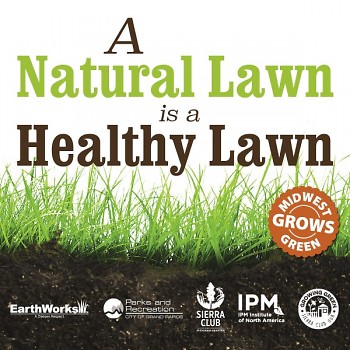Grand Rapids residents can enjoy a safer and cleaner Grand River this year thanks to efforts by the City, Sierra Club Grand Rapids and other local organizations to curb nearby pollution.
Starting this spring, Grand Rapids will eliminate the application of synthetic pesticides and fertilizers on Grand River adjacent parks of Sixth Street and Canal. The City recruited the technical support of the non-profit sustainable landscaping initiative Midwest Grows Green (MGG) to implement this natural lawn care transition.
“Grand Rapids can eliminate their synthetic chemical use by increasing cultural controls of core aeration, overseeding and mowing high that builds the soil, turf and plant system at every step,” explained Ryan Anderson, the leader of MGG. The City plans for these transitions at the 4.6-acre Sixth Street Park and 2.8-acre Canal Park to guide management of other Grand Rapids parks and motivate landowners near the Grand River to limit their own synthetic inputs.
The pollution eliminated from this pesticide-free parks program will aide many large-scale City initiatives such as the River For All project that strives to restore the rapids to the Grand River and waterfront, ensuring it remains a healthy, safe and vibrant resource for all to enjoy. “Restoration work along the Grand River, including this pesticide-free transition at Sixth Street and Canal Parks, showcases the work we’re committed to -- ensuring that we have this beautiful, clean river running through the heart of our city for generations to come,” said Grand Rapids Mayor Rosalynn Bliss.
To learn more about natural lawn care and apply these practices to your own lawn, please visit and take the MGG pledge at or visit MGG’s newest resource for pesticide reduction strategies on sports fields at LawnandLand.org.
The Rapidian, a program of the 501(c)3 nonprofit Community Media Center, relies on the community’s support to help cover the cost of training reporters and publishing content.
We need your help.
If each of our readers and content creators who values this community platform help support its creation and maintenance, The Rapidian can continue to educate and facilitate a conversation around issues for years to come.
Please support The Rapidian and make a contribution today.
